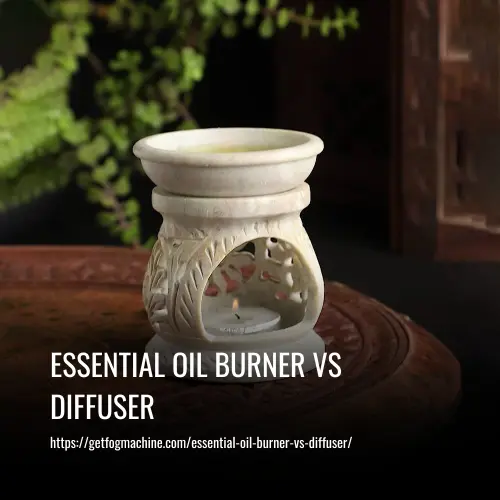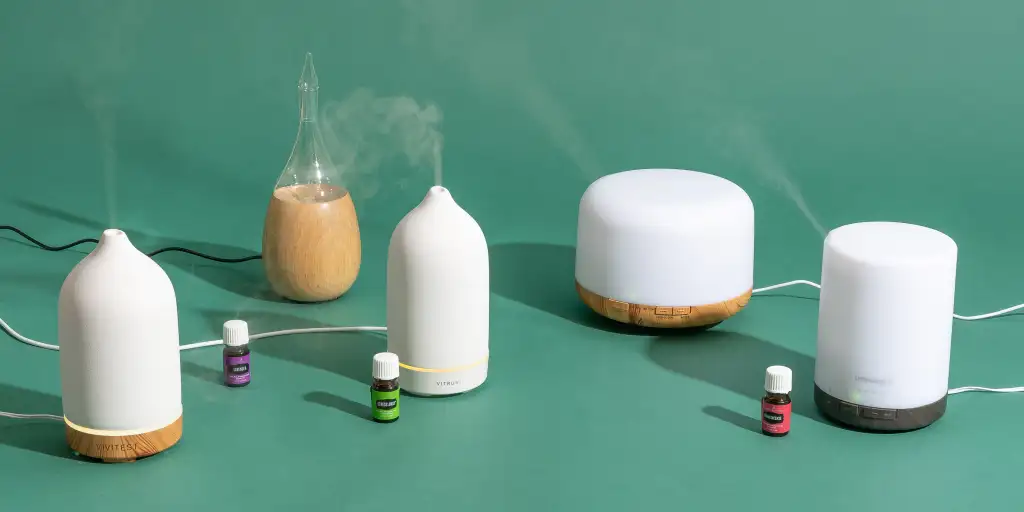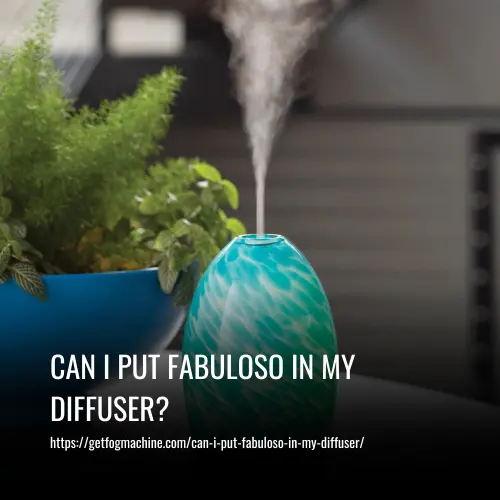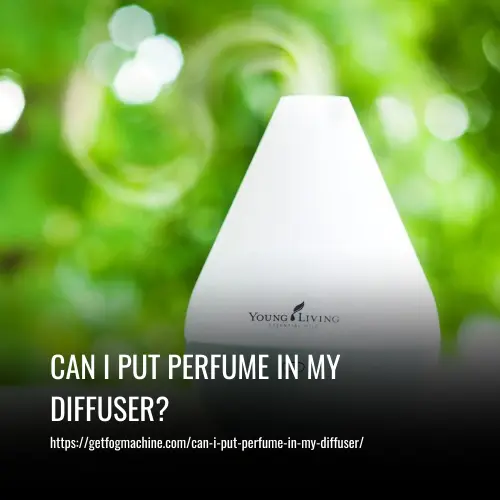Essential Oil Burner vs Diffuser: Which One is Right for You?
This post contains affiliate links. As an Amazon Associate, we earn from qualifying purchases.
An essential oil burner and an essential oil diffuser are both popular methods for enjoying the therapeutic benefits of essential oils. An essential oil burner typically uses a tea light candle or a small flame to heat a water and oil mixture, releasing the fragrance into the air.
On the other hand, an essential oil diffuser uses ultrasonic waves or electricity to disperse essential oil particles into the air as a fine mist. Diffusers are often preferred over burners because they offer a safer and more convenient option, eliminating the need for a naked flame and reducing the risk of accidents.
Diffusers are also more efficient at dispersing essential oils and are suitable for larger spaces. Additionally, they allow for a continuous and even distribution of the aroma, resulting in a longer-lasting and more enjoyable experience.
While burners can still provide a pleasant aroma, diffusers offer a superior level of fragrance and can be used in various settings, including commercial spaces and offices, to create a soothing and aromatic environment.

What is an Essential Oil Burner
An essential oil burner is a device used to vaporize essential oils, typically made of materials like copper, ceramic, or soapstone. It consists of a cup-shaped holder where you can place your essential oils, with space below to hold a candle that serves as a burner.
As the candle heats up, it evaporates the oil, converting it into vapor and releasing the scent into the room. Essential oil burners provide a simple and effective way to enjoy the therapeutic benefits and pleasant aromas of essential oils in your home or office space.
How Essential Oil Burners Work
Essential oil burners work by using heat to evaporate a mixture of water and essential oil, releasing the aroma into the air. Typically, a small tea light candle or electric light bulb is used as the heat source.
To use an essential oil burner, water and a few drops of essential oil are placed in a copper or ceramic bowl on top of the burner. The heat from the candle or light bulb warms the water, causing it to evaporate and carry the essential oil particles into the air. This process creates a pleasant aroma in the room.
Essential oil burners are affordable, ranging from $5 to $30, and are easily found in retail stores and online. They are also portable and can be used in various locations. Unlike scented candles and wax melts, using essential oil burners avoids exposure to harmful chemicals commonly found in these products.
Types Of Essential Oil Burners
There are several types of essential oil burners available, each offering a unique way to enjoy the therapeutic benefits of aromatherapy. Here are some popular options:
1. Tealight Candle Oil Burners
These oil burners are easy to use and cost-effective. Simply fill the cup-shaped holder with water, add a few drops of essential oils, light a tea light candle underneath, and you’re ready to go. Ceramic tealight oil burners are popular for their attractive design, easy cleaning, and simple setup.
2. Electric Essential Oil Burners
Safer than tealight oil burners, these electric burners eliminate the risk of fire by using a low-heat bowl to disperse the essential oils slowly. They are also a great decorative option for your home or office.
3. Lamp Ring Burners
These small ceramic rings fit on standard household table lamps and bulbs. Add a few drops of essential oils to the lamp ring, and when the bulb is turned on, the heat will diffuse the scent into the room. They are a convenient and economical way to enjoy the aromas.
4. Wax Melts
Wax melts are wickless candles that release a stronger fragrance than traditional scented candles when melted in a wax warming device. Opt for natural waxes like soy, coconut, or beeswax-based products for a cleaner scent experience.
These different types of essential oil burners offer versatility and convenience, allowing you to create a calming and soothing atmosphere in your personal spaces. Choose the one that best suits your needs and preferences to enjoy the healing properties of aromatherapy.
What is an Essential Oil Diffuser
An essential oil diffuser is an electrical appliance designed to disperse the aromatic properties of essential oils into the air. It works by adding a few drops of essential oil into a water tank, where the oil mixes with water. The diffuser then uses ultrasonic waves to create vibrations that transform the water and oil mixture into a fine mist.
This mist is then released into the air, filling the space with pleasant aromas and allowing for the therapeutic benefits of the essential oils to be experienced. Essential oil diffusers are popular in aromatherapy for their ease of use and ability to create a soothing and calming ambiance.

How Essential Oil Diffusers Work
Essential oil diffusers disperse essential oils into the air without using a heating element. There are two main types of diffusers: passive and active. Passive diffusers do not require electricity and can be as simple as felt or leather, wood, or more ornate options made of ceramic or clay.
To use a passive diffuser, you simply drip a few drops of oil over it and let it sit. The main benefit of passive diffusers is that you can enjoy the aroma without it spreading through a larger space, making them ideal for personal use or in shared environments. Ultrasonic diffusers, on the other hand, use water and essential oils to create a mist that is dispersed into the air without any heat.
They come in various styles and sizes, with automatic shut-off features for safety. Nebulizing diffusers use Bernoulli’s principle to create a powerful mist of pure essential oil. These diffusers do not dilute the oil with water, resulting in a more potent aroma. They also preserve the therapeutic properties of the oils. Nebulizers are made of glass, eliminating concerns over plastic materials.
Differences Between Essential Oil Burners and Diffusers
Essential oil burners and diffusers are popular tools for enjoying the therapeutic benefits of aromatherapy. While they serve the same purpose of infusing a space with pleasant aromas, there are notable differences between the two.
1. Mode of Operation
Essential oil diffusers break down the oils into tiny droplets of fine mist that float in the air, filling the room with their therapeutic benefits and pleasant scent. This makes them suitable for scenting larger spaces and maintaining the full therapeutic properties of the oils. On the other hand, essential oil burners heat the drops of oil, causing them to evaporate and release their scent into the surrounding air. However, the heating process can potentially alter the chemical composition of the oils, affecting their aromatherapy effects.
2. Safety
While both options have their safety considerations, oil diffusers are generally considered to be safer, especially for households with small children or pets. Oil burners involve an open flame, posing a fire hazard if left unattended. Moreover, some essential oils are flammable and should be used with caution in burners.
3. Length of Use
Oil burners rely on the duration of the candle used, meaning they will only work as long as the candle burns. In contrast, oil diffusers can operate for longer periods without much monitoring, as they usually have a water tank that can hold a sufficient amount of essential oil.
4. Cost
Essential oil burners are generally cheaper and easier to find, making them a more affordable option. On the other hand, oil diffusers tend to be comparatively more expensive, especially the electric ones.
5. Ease of Use
While both methods are relatively simple to use, oil diffusers are generally easier. With diffusers, all you have to do is put water and oil in the diffuser and turn it on. Oil burners, on the other hand, require monitoring and the frequent replacement of candles.
6. Coverage
Diffusers cover a larger area and distribute essential oils more evenly, making them suitable for spacious rooms like living rooms and bedrooms. In contrast, oil burners are better suited for smaller spaces like bathrooms or office setups.
7. Looks
Ceramic burners are commonly used with oil burners and are known for their aesthetic appeal. The flame of the burning candle adds a soothing touch to the ambiance. Reed diffusers, used with oil diffusers, are simpler and more functional. However, some diffusers also come in decorative glass and ceramic vessels that can enhance the visual appeal.
8. Availability
Ceramic burners are widely available and can be found at lower prices. However, oil diffusers have gained popularity and can now be found in major home improvement stores and online retailers.
9. Maintenance
Oil burners require regular cleaning to remove melted wax and soot. Diffusers, on the other hand, are comparatively easier to maintain.
10. Aesthetics
Oil burners, with their lit candles, create a romantic setting, especially in low light. The warmth of the flame adds to the ambiance. This aspect should be considered when comparing the two methods.
Similarities Between Oil Burners and Diffusers
Oil burners and diffusers are both popular methods used to release the pleasant aromas of essential oils into the air. Despite their differences in functionality and design, they share some similarities that make them appealing options for aromatherapy enthusiasts.
One similarity is the ease of use. Both oil burners and diffusers are simple to operate, requiring minimal effort to disperse the aromatic scents. Additionally, they are widely available in various decors and styles, allowing users to find the perfect match for their home or office spaces.
Another common feature is the use of water and essential oils. Both oil burners and diffusers require a water mixture to be combined with a few drops of essential oil. This combination helps to release the therapeutic properties and fragrance of essential oils into the surrounding environment.
Lastly, oil burners and diffusers are both used to freshen the air and create a soothing atmosphere. Whether it’s in residential or commercial spaces, these devices work efficiently to enhance the ambiance and provide a calm and peaceful experience.
How To Use Essential Oil Burners Safely
Using essential oil burners, also known as oil warmers or oil diffusers, can create a cozy and aromatic ambiance in your home. However, it is crucial to prioritize safety when using these devices. Here are some essential safety practices to follow:
1. Maintain a low temperature for your oil burner
High temperatures can cause essential oils to burn quickly and alter their therapeutic effects. Ensure that the candle flame is at least six centimeters away from the bottom of the oil holder to prevent excessive heat. Additionally, be aware that many pure essential oils are flammable.
2. Remember to snuff out the candle
After the liquid in the oil burner is exhausted, promptly snuff out the candle. It is not advisable to let the candle burn throughout the night. Always extinguish the flame before sleeping. If fire safety is a concern, opting for an oil diffuser may be a safer choice.
3. Don’t use it for more than 40 minutes
To avoid potential headaches, limit the use of your essential oil burner to no more than 40 minutes at a time. Taking breaks between uses allows you to enjoy the aromatic benefits without overexposure.
4. Clean your oil burner after use
Wait until the burner has cooled down before cleaning. Use a damp cloth with liquid detergent to remove any residue. If stubborn oil remains, a mixture of baking soda and water can be effective. Avoid using a metal scourer to prevent damage to the oil burner.
Which One Should You Buy
When it comes to choosing between an essential oil burner and a diffuser, there are a few factors to consider. Here are some key points to keep in mind while making your decision.
1. Price
If you’re looking to save money, an oil burner is a better choice. While the initial cost may be lower than that of a diffuser, it’s important to remember that oil burners require monthly maintenance. This means you’ll need to regularly purchase candles, which can burn out quickly and need frequent replacement.
2. Safety
If you have children or pets in your home, a diffuser is the safer option. With no open flame, diffusers eliminate the risk of accidents or burns often associated with oil burners. This makes them a more suitable choice for households with little ones or curious pets.
3. Coverage
If you need to cover a larger area, a diffuser is your best bet. They are designed to disperse essential oils more efficiently, easily filling larger spaces with pleasant aromas. However, if you only need to scent a small, limited area, an oil burner can still get the job done.
4. Efficiency and Benefits
Overall, diffusers offer greater efficiency and additional benefits compared to oil burners. They utilize ultrasonic waves or heat to disperse essential oil particles into the air, creating a more consistent and longer-lasting aroma. Additionally, diffusers often come with features such as timers, adjustable mist settings, and even color-changing lights, enhancing your aromatherapy experience.
Essential Oil Burner Vs. Diffuser – Which Is Better?
Both essential oil burners and diffusers offer similar therapeutic benefits. They are designed to dispense the therapeutic aromatherapy treatment of essential oils. The primary difference between the two is the method of dispersal.
An essential oil burner uses heat, typically from a candle flame, to evaporate the essential oil and release its fragrance into the air. While burners can create a pleasant aroma, they are not considered safe around children and require monitoring to ensure the water in the bowl doesn’t evaporate and cause cracking.
On the other hand, essential oil diffusers use various techniques like ultrasonic waves or electric heat to create a fine mist of essential oil particles that are released into the air. Diffusers are generally considered safer and more convenient to use, as they don’t require an open flame or constant monitoring. They can also cover larger spaces and provide a continuous stream of fragrance without the need for frequent refills.
FAQs
Both oil burners and diffusers have their benefits and drawbacks. While oil diffusers are safer and don’t require constant monitoring, oil burners are a cheaper option. Both can effectively provide the benefits of essential oils, although some experts believe that heating aroma oils in burners can change their therapeutic properties.
Yes, you can use essential oils in an oil burner. However, it is recommended to use only 3-4 drops and avoid making it overly powerful.
Yes, it is generally safe to leave a diffuser on all night, especially when using all-natural diffusers with aromatic essential oils. It can help create a soothing environment for better sleep.
Most oil burners use candles to provide light. However, there are also models that have built-in electric heating elements, eliminating the need for candles.
Essential oil burners are safe as long as they are used correctly. Since it involves a candle flame, it is important to choose a safe place to put the burner and not burn the candle after the liquid has dried up in the bowl. It is recommended to snuff out the candle after 40 minutes of use.
Essential oil burners are usually made of ceramic, soapstone, or copper. These materials help distribute heat evenly and provide a stable base for the burner.
Oil burners are readily available in aromatherapy stores and can also be purchased online from platforms like Amazon.
For preserving the therapeutic benefits of essential oils, using an oil diffuser is recommended. However, if you are solely interested in the aroma and not concerned about wellness benefits, an oil burner can be used. Ultimately, the choice depends on personal preference and specific needs.
While oil diffusers are safer and don’t require constant monitoring, oil burners are a cheaper option. Both methods can effectively provide the benefits of essential oils, although some experts believe that heating aroma oils can change their therapeutic properties.
Conclusion
Both essential oil burners and diffusers have their own unique advantages when it comes to dispersing the therapeutic benefits of essential oils. Essential oil burners, with their use of candle flames or electric heat, create a cozy and relaxing ambiance while infusing the air with pleasant aromas. They are a great choice for smaller spaces or for those who enjoy the soft glow of candles.
On the other hand, diffusers, particularly ultrasonic ones, use water and ultrasonic waves to break down essential oil particles and disperse them as a fine mist. This method allows for a more even and steady release of aroma throughout larger spaces. It also preserves the therapeutic properties of the oils by not subjecting them to high heat. Ultimately, the choice between a burner and a diffuser depends on personal preference and the intended use.






